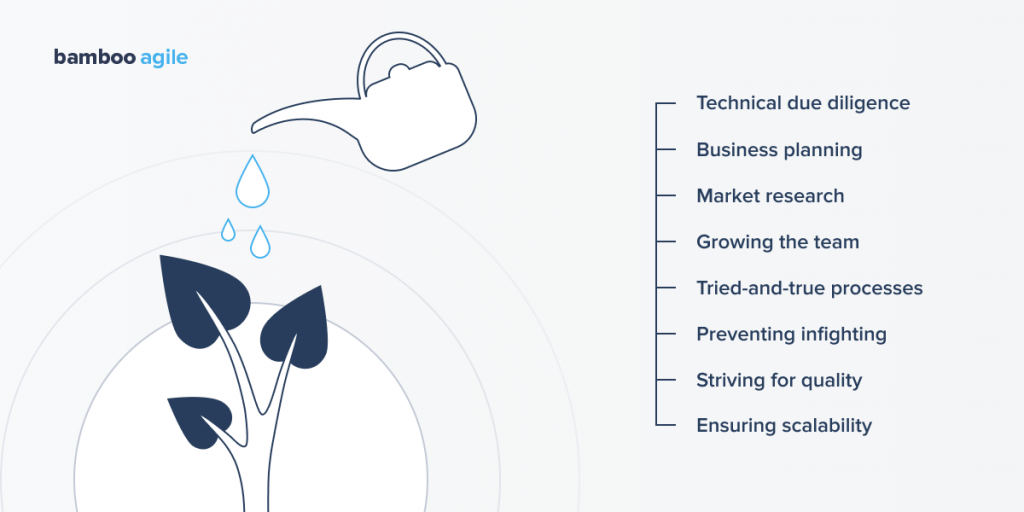Introduction
According to the Bureau of Labor Statistics, almost a fifth of new businesses close their doors within their first year. It’s not just a matter of budget: a staggering 70% of companies fail after raising their seed funding, according to CBS Insights. How come?
People tend to think that all that stands between a startup and success is cash, but the statistics prove that this idea doesn’t hold much ground in practice. Many investors and entrepreneurs struggle to understand the core reasons for startup failure, which lie not in the amount of money invested, but in the way the startup functions.
It’s easy to get discouraged by the confusion and the intimidating data – what’s the point of investing if it means almost certain failure? But don’t lose heart: there are plenty of ways to raise the odds of a startup’s success.
This article will look into some common pitfalls young businesses face and offer solutions for how to overcome, or better, prevent them. With this knowledge, you’ll be able to guide the IT startup under your wing in the right direction.
How to save a startup?

VCs tend to face a common problem: even if they invest in a seemingly decent team with a decent idea, there’s no guarantee that those resources will be correctly allocated. There are a couple of things you can do to minimize the risk of throwing your own money down the drain, as well as to help a promising startup become the best it can be.
Technical due diligence
Due diligence is an evaluation process that determines whether a company is worth investing in. Rigorous technical due diligence is essential to understanding how well equipped an IT business is in terms of tech and expertise, and whether it will be able to scale effectively as time goes on.
Technical due diligence can either be done by the investors themselves or via a third party. The problem with the first option is that VCs may not have the level of IT knowledge needed to properly evaluate the state of the company, especially when it comes to technological expertise. Hiring an unaffiliated software company is a much better call in this case.
Development companies such as Bamboo Agile can provide an objective and thorough evaluation of an IT startup thanks to their established tech industry expertise. They know an unstable infrastructure when they see one; more importantly, they know that waving it off with a “whatever, we’ll rewrite everything from scratch” won’t cut it – it’s just not that simple.
The fact of the matter is that a complete rewrite is often a surefire way to exhaust the startup’s budget without gaining any business value. What’s more, the process itself is both tedious and demoralising for the team. With that in mind, a third-party company can offer suggestions and strategies for how to improve the already existing infrastructure with minimal monetary losses.
Business planning
According to Autopsy research, 18.7% of startups fail due to the lack of a clear business model. Many founders seem to be under the impression that a business plan is more of a hindrance than a benefit. Because of that their startups rely on future funding rounds, enterprise deals or acquisitions instead of actual returns from their product.
Granted, turning a profit is no easy task for a young business. Nevertheless, it’s good to have a concrete plan to at least reach a break-even point. Investors can’t pump money into startups that get negative revenue forever. And in case a crisis hits (COVID-19 being a relevant example), the funding is very likely to be cut.
If a startup does not generate revenue, there’s no guarantee that bigger investments will make the audiences more willing to buy the product. The only real way to solve the problem is by actually conjuring a business plan or by having the startup rework the product from the ground up to be more appealing to potential users – either completely on their own or with a third-party specialist. Though, the latter option is still very likely to fail if the startup refuses to employ strict business planning.
All in all, having a good business plan is essential to ensuring the company’s sustainability.
Market research
Here’s an ironic statistic: according to Wilbur Labs, 51.3% of startups thought they were adequately prepared when they launched, but at the same time, lack of planning and preparation is cited as the third most common reason for company failure. What’s more, the most popular advice given by failed entrepreneurs is to do more research prior to launch, according to the same Wilbur Labs study.
A product-market fit will make or break a startup. Either overestimating or underestimating the demand will result in serious losses, so the best thing a startup can do is to conduct extensive research of its target user base. Likewise, the worst thing it can do is operate based on pure assumption. Startups must communicate with their potential clients. For instance, surveys and in-depth interviews are simple and effective ways to receive valuable feedback.
Investors can – and should – also chime in. VCs tend to have a good understanding of how the general business environment operates, and can therefore provide some valuable insights. That said, when there is a contradiction between what the customers and the investors recommend, it’s better to trust the former.
Growing the team
A company has to hire more and more people as it expands. But not every startup can afford to pay a few extra salaries, especially when their work processes aren’t yet perfectly established and risk having a lot of unforeseen costs. This is where outstaffing and outsourcing come into play.
Outstaffing can be a very effective move for reaching particular milestones, given the company has a clear business vision. It’s also a lot cheaper than scouting and hiring in-house employees.
Outsourcing is a larger-scale option that usually covers the entire project. What makes this one especially appealing is the combination of guaranteed service quality and budget control. The latter is done by using the Fixed Price method on either some segments of the project or on its entirety. With that, the skilled staff will help the startup achieve its goals while saving the client a lot of stress and unnecessary spendings.
Tried-and-true processes
The best startups can fall victim to mismanagement. Even when everything looks fine during the initial check, the processes may fall apart if the startup tries too hard to please its investors. This desire to look good in the eyes of VCs can lead to faulty reports and an overall lack of transparency.
One way to avoid this is to pass the technical processes onto a third-party development team. While outsourcing companies have an industry reputation to upkeep, it’s hardly comparable to the frantic methods startups may resort to in order to gain VC’s approval. And since outsourced developers have no direct connection to the startup company’s investors, they don’t need to go out of their way to appease them. Their job is to deliver a quality product – and that’s what they focus on first and foremost.
Outsourced developers use well-established workflows and prioritize transparency above all else. This straightforward approach means no hidden rewrites and clearer financial reporting. This makes tracking the project’s progress and its budget a lot easier; what’s more, it helps make more reliable forecasts for the future.
Preventing infighting
A large number of startups collapse due to their team’s conflicting interests. This rarely happens when the business is just raising its seed funding, but is very common when the project is already backed and has consumed a lot of resources. Naturally, it’s a huge loss for the VCs.
Disregarding such reasons as a personal dislike or conflicting visions for what the product should be, these fallouts often happen as a result of chaotic management and a stressful work environment. There are plenty of ways to mess up a development team’s organization, especially as the project grows bigger over time. The lack of options in-house teams have when it comes to talent also takes a toll on the team’s productivity and the end product’s quality.
One of the key benefits of outsourcing is, in fact, options. There are dozens of reliable outsourcing companies to choose from all across the globe. Each company has a varied team and offers its own unique, yet professional approach. Startups can find the one that suits them best, and, by entrusting all the technicalities to the outsourced developers, free up some time to focus on their business’ direction.
This also means less disagreement between different investors. Since outsourcing companies have an established reputation in the software development industry, reaching a consensus on whether their services are worth the budget is a generally painless process.
Striving for quality
Poor product quality doesn’t just mean disgruntled customers. It means constant crashes and reworks, dropping morale, and, of course, loss of money. Naturally, nobody wants to make a bad product on purpose – it’s simply something that comes about as a result of the development team’s lack of experience.
Even if the specialists involved have some industry expertise, there’s rarely a guarantee that they can handle building a brand new business from scratch, at least not when they have to manage every aspect of it simultaneously. The overwhelming load often leads to a loss of focus, which is one of the top reasons for startup failure, according to CB Insights Research.
In that case, even if the product is completed, that lack of focus and management skills will be reflected in its quality. After all, quality tends to become a secondary priority when the team is too focused on marketing and looking good in the eyes of investors.
That’s when hiring third-party developers will help. High product quality is outsourcing companies’ bread and butter. So if the startup struggles to deliver on its promises because of mismanagement and lack of necessary technical knowledge, it may be best to ask someone else to take over the development process.
Ensuring scalability
According to Wilbur Labs, 17.7% of startups die because of their failure to expand. Growing a business requires a lot of thought and planning, and so does scaling the product. What many startups fail to realize is that their project needs a strong base to be scalable in the first place. You can’t build a sturdy house without a solid foundation – software development works the exact same way.
This is why excuses like “we’ll just rewrite the code sometime later” hold no weight. By the time “later” comes, the project will need to expand, integrate with more tech, and add new features. It’s a lose-lose situation: the company either spends valuable resources on course correction or tries to awkwardly work around the flimsy architecture. The latter may not sound too bad at first, but keep in mind it means sacrificing a lot more time and resources than would be necessary otherwise – and the results the team will get from that will be dubious at best.
Ensuring that the product is easy to build upon can be done by attracting qualified professionals as early as possible. Outsourcing companies are always interested in developing scalable projects. At the end of the day, their reputation hinges on their level of service, and helping a startup get off the ground with a great solution means a huge boost to the outsourcing company’s credibility.
What’s more, they can build long-term relationships with the startups. This way the company can ensure that the app is expanded upon in the most efficient way possible, since the team knows the inner workings of it better than anyone else. It’s also more efficient money-wise: you could save some upfront by finding a cheaper outsourcing vendor, sure, but you will ultimately spend more over time if you keep bouncing between different outsourcing companies.
Conclusion

While the statistics may seem ruthless, there’s no need to lose hope. There are numerous ways to help a startup reach its full potential, mainly:
- Perform thorough due diligence – make sure the startup has the means and the skills necessary to achieve its goals;
- Conjure a business plan and stick to it – it will help the company manage the resources it has more efficiently;
- Do as much research as possible – the product has to be viable, otherwise, the investments will never pay off;
- Be smarter about hiring – consider such options as outstaffing and outsourcing;
- Employ proven methodologies – they’re the industry standard for a reason;
- Compromise – take everyone’s opinion into account, lest you want the business to fall apart because of infighting;
- Put quality first – no matter how big your budget is, no one will want to buy a poorly made product;
- Create with scalability in mind – the stronger the base, the easier it is to build upon.
If the founders and investors stay mindful of all these points, the startup is a lot more likely to join the top 30%. Managing all of them at the same time is a difficult task, however, so don’t shy away from the possibility of hiring a third-party team to aid with the technical aspects of the project.
Bamboo Agile is a trusted software developer that likes seeing promising startups grow.
If you have a great project in the works, feel free to contact us for a free consultation. We’ll be happy to share our expertise!



